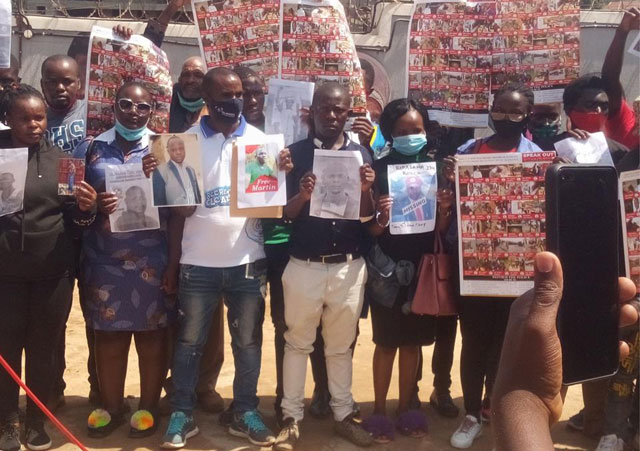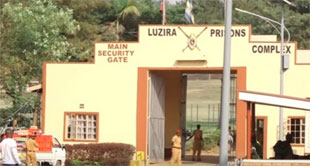
Kampala, Uganda | THE INDEPENDENT | As several victims of election violence who went missing in the build-up and aftermath of 2021 General Elections resurface, many of them have remained tight lipped on what they went through at the hands of their abductors. This has drawn concern from human rights defenders, the general population and politicians alike, saying it frustrates efforts to push for justice for the victims.
In Buwama town council in Mpigi district, nine people were allegedly picked up off the streets or their homes allegedly by armed men in numberless white minivans in January 2021. They suffered in Kibukuta swamp near Jalia City along Kampala-Masaka in March where they dropped off by the captors.
However, the abductees including the Buwama Town Council Chairperson-elect Abdul-Rashid Nkinga has shied away from speaking about what happened to them in captivity.“I don’t have anything to say. We came back and we are alive,” it’s the common phrase from most from the abductees.
Some of them only praise their captors for feeding them well when they were locked up in unknown places against their will. Besides the silence of the victims, there is also fear in the area where these people live with many residents shying away from publically commenting on politics or the issues of the abductees.
“No one will talk to you over that matter in the area. No one wants to end up being abducted. At least our people have been returned that is good enough for us,” an old man told URN at Buwama town council headquarters recently. Also, 18 abductees in Kyotera who returned last month were unwilling to share their ordeal when approached by our reporter.
“Abductions have taught us to shut up. When dealing with politics, especially supporting opposition candidates, it’s important to keep quiet,” some residents said during an interview with URN. Joel Ssenyonyi, the National Unity Platform spokesperson, says that this is a psychological tactic deployed by the ruling government to maintain its grip on their adversaries and leave no trace of the injustices and human rights violations.
“The first sets of abductees were returned and lived to narrate their terrifying ordeal of what they went through at the hands of their tormentors whom they claim are security operatives. The abductees were narrating disgusting stories of inhumane things that had happened. The state must have felt ashamed and decided to change tactics,” said Ssenyonyi.
According to Ssenyonyi, whatever is done to the victims such as coercion, intimidation and instilling fear is not only to silence the abductees but their communities as well. “This is intended to put a veil on the violations thus blocking citizens and the international community from learning about the abuses. Already with the few recorded cases, the government has been put on the spot with some individuals facing sanctions from the international community,” said Ssenyonyi.
Human Rights lawyer, Nicholas Opio, says that the behaviour of the victims is just is reflecting a multifaceted experience characterized by intimidation, fear and loss of trust in the instruments of accountability in the state and outside the state.
Opio is worried that the new approach is intended to deny the country a detailed account of the victims and therefore make it hard for concerned players and human right defenders to take on the perpetrators. He, however, notes that although many people are being intimidated by their tormentor and succumb to the threats, they believe that as day follows night whatever happened will come to the light soon.
Brig-Gen Flavia Byekwaso, the UPDF spokesperson, which is being accused of some of the violation distance the military from the said mode of operation, saying that the force doesn’t gag people as it respects freedom of speech.
There have been queries on why the police are not following up cases of the abductees if at all the state was never involved. “When most of the victims went missing, their relatives reported. what has happened to those cases? Of course, these different security agencies are playing syndicate,” said Ssenyonyi.
But Police Spokesperson, Fred Enanga says that when the abductees return, police try to pursue their case but can’t do much because most of them are still traumatized. “Police cannot proceed with the case without the input of the victims. Such people must be handled with care. We can handle their cases when they are ready to open up and discuss what happened to them during the time of their disappearance,” said Enanga.
Dr. Paul Nyende, a senior lecturer of psychology at Makerere University agrees with Enanga’s argument noting that it is natural for abduction victims to remain silent because they don’t want to remember their ordeal.
Referring to the Stockholm syndrome where victims praise or side with their captives, Nyende notes that quite often the victims are indoctrinated and might need psychosocial support from experts.
Dr. Robert Ojamba, a political scientist from Kyambogo University, says that instigation of fear and intimidation to suppress rivalries is not a new tactic in Uganda as similar scenes were witnessed from the colonial government to the President Iddi Amin and Milton Obote’s regimes.
He, however, says that whoever is behind the current wave of torture has gone an extra mile since in the past such acts were never directed at regular civilians. According to him, the tactic appears to be working given the ever-developing fear and mistrust for each other in the public.
*******
URN
 The Independent Uganda: You get the Truth we Pay the Price
The Independent Uganda: You get the Truth we Pay the Price


